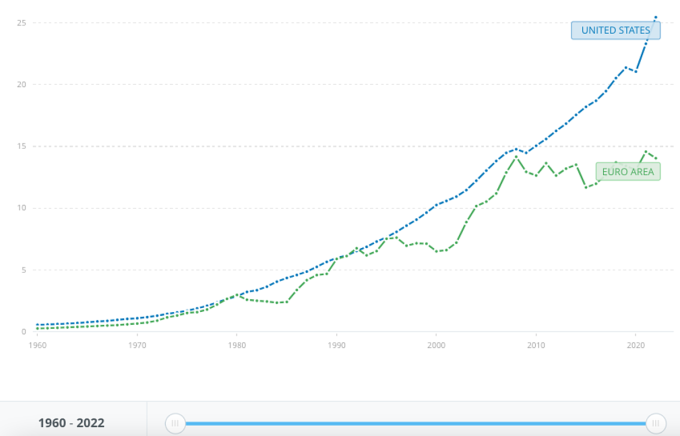The economic size of Europe and the US is increasingly different as the old continent does not have many advantages in energy and capital resources.
From 1960 to 2008, the GDP of the United States and Europe moved in tandem, although the old continent had some bumpier periods than the US’s upward trajectory. In 2008, the GDP gap between the two economies on both sides of the Atlantic was negligible, with the US and Europe’s GDPs at $14.77 trillion and $14.16 trillion, respectively, according to World Bank data in current prices.
However, 15 years on, Europe's GDP has remained largely unchanged, reaching $14.04 trillion last year. Meanwhile, the world's number one economy has reached $25.46 trillion. Thus, the European economy is now only 55% the size of the US.

GDP size of the US (blue) and Europe (green). Unit: trillion USD. Graphics: World Bank
The European Center for International Political Economy (ECIPE), a Brussels-based think tank, released a ranking of GDP per capita in the US and European countries in July.
As a result, Italy is higher than Mississippi, the poorest state in the US. France is slightly better off, with GDP per capita between Idaho and Arkansas, which rank 48th and 49th on the index. Meanwhile, Europe’s economic powerhouse, Germany, is between Oklahoma and Maine, which rank 38th and 39th in the US.
In an article titled “Is Britain really as poor as Mississippi?” in the Financial Times last month, figures from the Organisation for Economic Co-operation and Development (OECD) showed that Britain’s GDP per capita was 15% higher than Mississippi’s over the past two decades. However, this figure still only ranked above about six of the poorest US states.
But focusing on comparisons does not fully reflect the underlying, equally troubling trends in the economic composition of some European countries in terms of administrative units. A common feature is the relatively high economic dependence on a small number of localities within the country in some European countries.
In the UK, removing London’s contribution would reduce GDP per capita by 14%, enough to make it lower than the poorest state in the US. In the Netherlands, without Amsterdam, the country’s GDP per capita would fall by 5%. Germany’s result would fall by 1% without its most productive city, Munich. Meanwhile, excluding the San Francisco Bay Area, from the Golden Gate Bridge to Cupertino, the US’s GDP per capita would fall by just 4%.
In the case of Britain, decades of London-centricity for everything from finance to culture to politics has created a reluctance to allow any other region to rise sufficiently and raised the question that the country needs more than just an economic engine as its capital.
On a continental level, as after every crisis in history, Europe has stagnated once again since Covid-19. The economic strength of the old continent is "respected" as long as Germany is healthy, according to Le Monde . However, the German economy is facing many challenges since Russia cut off gas and the tougher stance of China - the leading market for German exports.
Meanwhile, the Americans do not worry about these issues. They have huge energy resources, producing 20% of the world's crude oil, compared to 12% for Saudi Arabia and 11% for Russia.
"For them, China is a subcontracting area, not an outlet for high-value-added products. Tesla's victory is making Mercedes and BMW look obsolete," commented Arnaud Leparmentier, a resident correspondent for Le Monde in New York (USA).

A staff member hangs the US flag before US President Joe Biden arrives for a meeting of the European Council in Brussels, Belgium, March 24, 2022. Photo: Xinhua
The classic European lifestyle, long envied by outsiders, is losing its luster as the region’s purchasing power dwindles, according to the Wall Street Journal . In 2008, purchasing power in Europe and the United States was on par. Today, the gap is 57%. The average American salary is now around $77,500, nearly 1.5 times the $52,800 of the French.
At the Lisbon European Council in 2000, the region set the ambition to become “the world's most dynamic and competitive knowledge-based economy” by 2010. And the 2000s were indeed the decade of knowledge, but in America.
With the rise of Google, Apple, Facebook, Amazon and now artificial intelligence, the prosperity is reflected on Wall Street. Apple is worth $2.8 trillion, Microsoft $2.4 trillion, Meta and Tesla are worth $750 billion.
How $12 billion French carmaker Renault can hope to compete with Elon Musk, who is building $5-10 billion factories, is a big question. French President Emmanuel Macron has announced a €200 million investment in a virtual universe (metaverse) by 2030, while Meta’s founder has invested more than $30 billion in the technology.
With artificial intelligence, according to Stanford University, private investment in France will be at $1.7 billion by 2022 compared to $47 billion in the US. "Europeans are poorer and lack financial resources, so they could soon be left out of the game," Le Monde worries.
In 1990, Europe produced 44% of the world’s semiconductors. That figure is now 9%; compared with 12% for the US. Both the EU and the US are rushing to build up their capacity. But while the US is expected to have 14 new semiconductor factories operational by 2025, Europe has added fewer than 10, compared with 43 new facilities in China and Taiwan.
The dollar’s status as the world’s reserve currency gives the US the ability to finance its development ambitions. As one European industrialist put it: “They just swipe their credit card.” By contrast, the EU has a much smaller budget and is only just starting to issue common debt.
Private capital is also much more readily available in the US. Paul Achleitner, chairman of Deutsche Bank’s global advisory board, said that Europe is now “almost entirely dependent on US capital markets”. Europe has few large pension funds that provide the depth of capital markets that the US does. There is also much talk of a “capital markets union” but little progress has been made.
So what else does Europe have that makes it a world leader? First, the sheer size of the EU's single market means that companies around the world are still subject to the bloc's regulations, a phenomenon known as the "Brussels effect".
Europe is also good at “lifestyle” industries. Nearly two-thirds of the world’s tourists come from Europe. The luxury goods market is dominated by European companies. Soccer, the world’s most popular sport, is dominated by European teams – although many of the biggest clubs are now owned by Middle Eastern, American or Asian investors.
Europe’s dominance in the lifestyle industry suggests that life on the continent remains appealing to many. But perhaps that’s part of the problem. Without a greater sense of threat, Europe may never have the will to reverse the inevitable decline of its power, influence and wealth, according to the Financial Times .
Phien An ( according to Lemonde, FT )
Source link


































































































Comment (0)